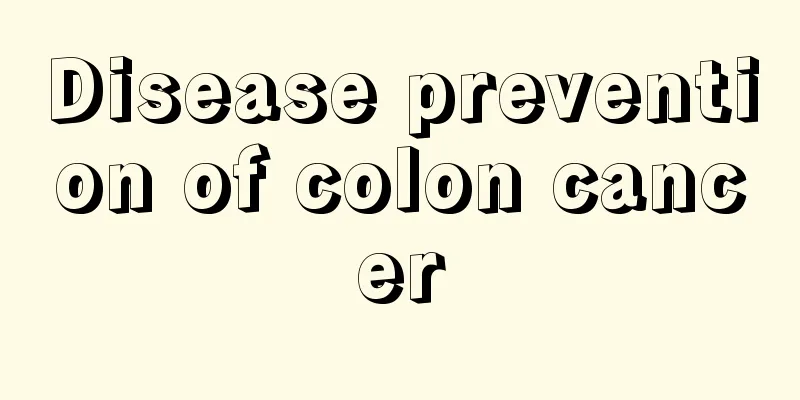Disease prevention of colon cancer

|
In recent years, the incidence of colon cancer has increased. Prevention of colon cancer can start from the following aspects: 1. Regular check-ups: Men over 40 years old, patients with familial multiple intestinal polyps, ulcerative colitis, chronic schistosomiasis and people with a family history of colorectal cancer are all at high risk of colorectal cancer and should have regular check-ups. Early symptoms of colorectal cancer include changes in bowel habits, alternating diarrhea and constipation, bloody or black stools, flatter and thinner stools, etc. You should be alert to the signs of colorectal cancer. 2. Prevent and treat intestinal diseases: Actively prevent various polyps, chronic enteritis, schistosomiasis, chronic dysentery, etc., especially intestinal polyps should be treated early. Adenomatous polyps are true tumor polyps and precancerous lesions of colon cancer. Therefore, when colon adenomas are found, they should be removed at the benign adenoma stage and pathological examination should be performed. If not treated early, most of them will turn into colorectal cancer. In addition, habitual constipation should be actively treated and attention should be paid to keeping bowel movements smooth. 3. Chemical drug prevention: The drugs currently used to prevent colon cancer are mainly: (1) Antioxidants: The mechanism of action is to protect DNA from free radical damage, including vitamins C and E, β2-carotene, folic acid, etc. An 8-year study showed that the incidence of colorectal cancer in male smokers aged 50 to 69 who took vitamin E was reduced by 16% compared with the placebo control group. (2) Nonsteroidal anti-inflammatory drugs: This type of drug has been proven to inhibit the occurrence of colon cancer. Aspirin and nonsteroidal anti-inflammatory drugs have the effect of reducing the incidence of colon cancer. Regular use of aspirin or nonsteroidal anti-inflammatory drugs, at least 16 days a month and more than 3 months a year, can reduce the risk of colon cancer by 50% and the risk of death from colon cancer by 40%. 4. Improve eating habits: Change the habit of eating meat and high-protein foods as the staple food, eat less high-fat foods, especially control the intake of animal fat. Reasonably arrange daily diet, eat more fresh fruits, vegetables and other foods rich in carbohydrates and crude fiber, appropriately increase the proportion of coarse grains and whole grains in the staple food, and avoid being too fine or too refined. 5. Exercise actively: find an exercise method that suits you, strengthen your physical fitness, improve your immunity, relax yourself, relieve stress, and maintain a good attitude. |
<<: The best diet choice after colon cancer surgery
Recommend
What tests should be done if cerebral infarction is suspected
Cerebral infarction is a very risky disease. If t...
My arm was bruised after having my blood drawn
If your arm appears bruised after a blood test, t...
What is the normal level of bilirubin?
What is bilirubin? This is probably a question th...
Can patients with breast cancer be cured?
I can't be a clean person. I am now a common ...
How long can one live with advanced esophageal cancer
How long one can live with advanced esophageal ca...
What are the nursing methods for testicular cancer
Although testicular cancer has a high chance of b...
What are the pathological variations of prostate cancer
Atrophic variant: The tumor cells of prostate can...
What is the treatment for allergic conjunctivitis
Allergy is not only a common cause of some skin d...
What food is good for patients with advanced laryngeal cancer
Just hearing this will make people shudder. There...
How to wash grapes
Nowadays, food hygiene and safety is an issue tha...
What is the normal value of urine occult blood?
From a medical perspective, the test results for ...
Is incense harmful to the human body? What are the effects of aromatherapy
Now many people have just moved into a new house ...
Is it useful to drink glucose after drinking too much alcohol?
When you drink too much, you will feel a severe h...
Does Laozao have high calories?
Laozao is actually what we often call rice wine. ...
Is the chance of false healing of anal fistula high?
Anal fistula is caused by abscesses around the an...









